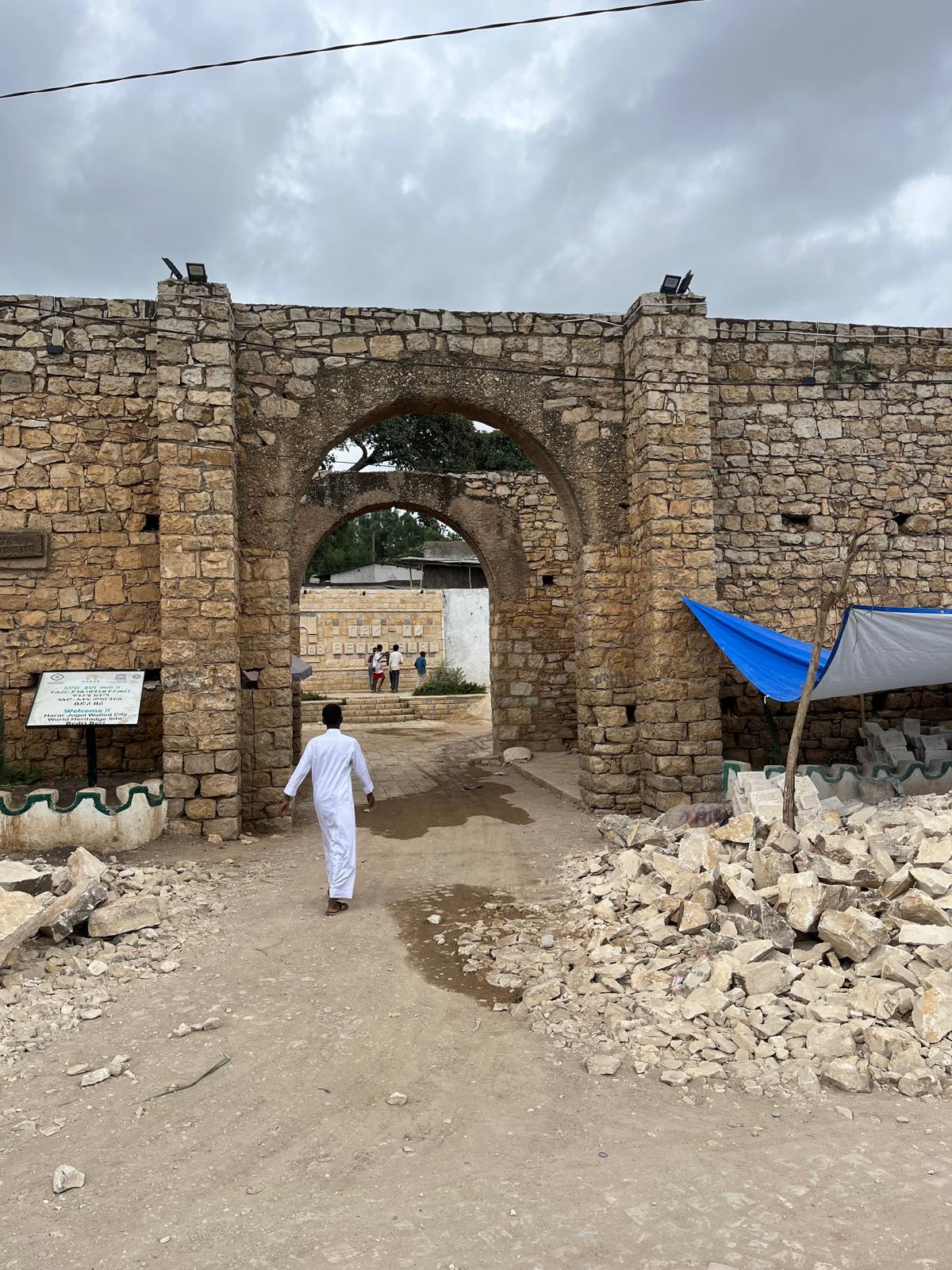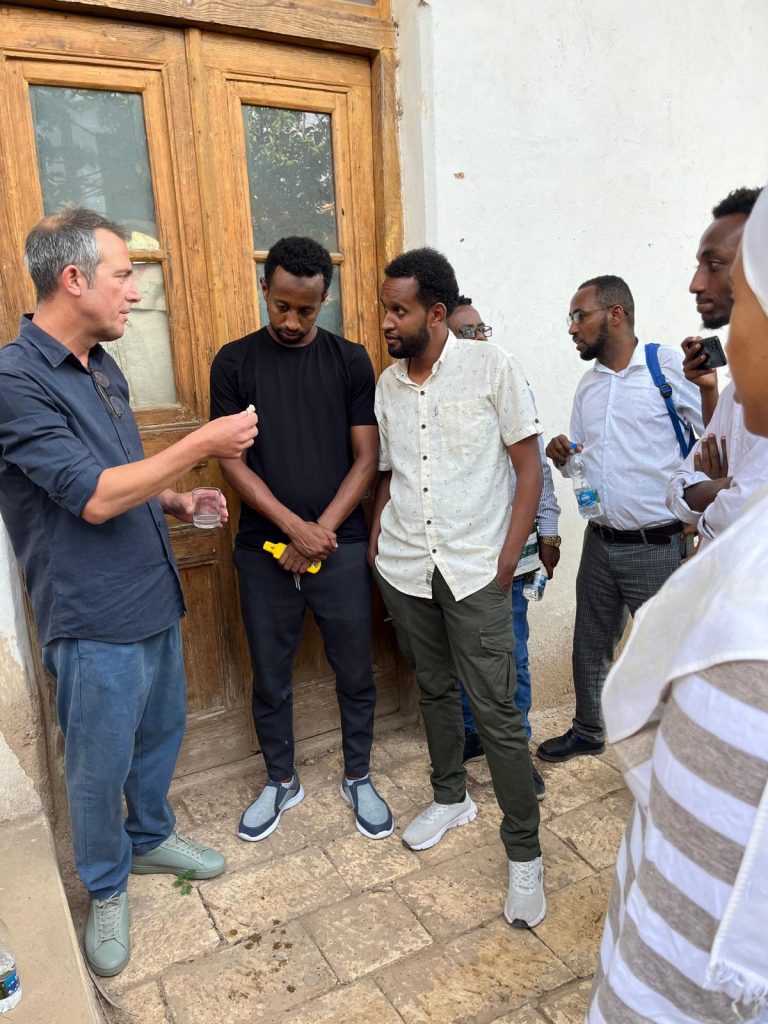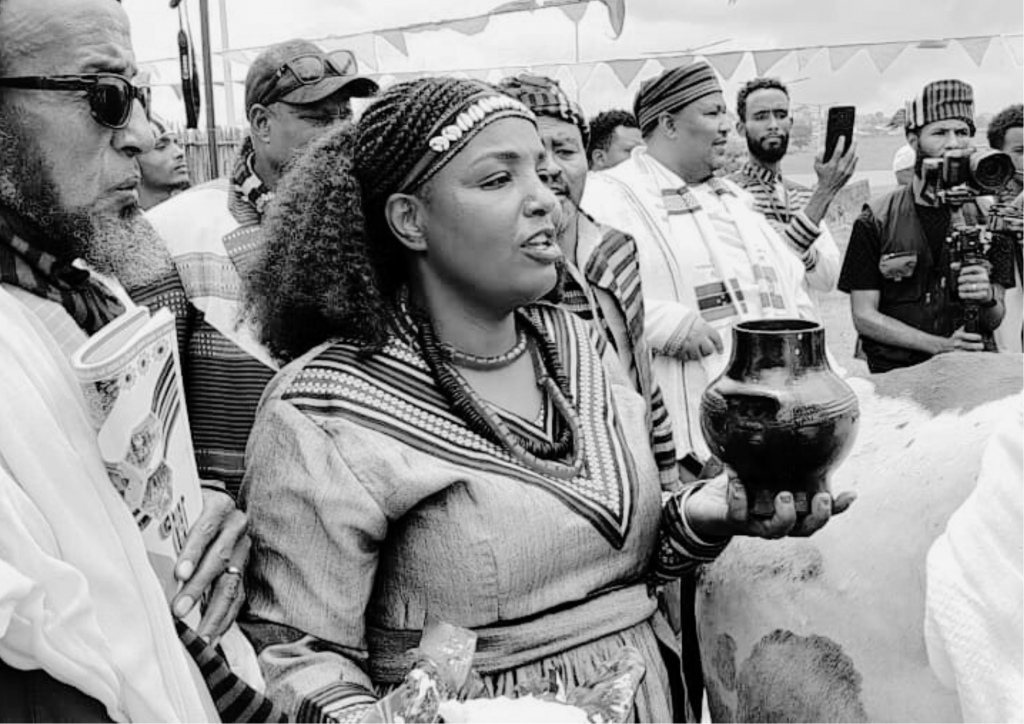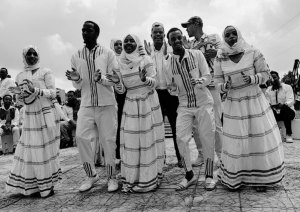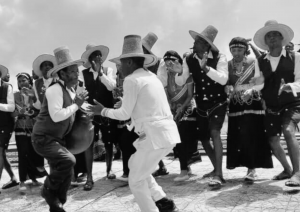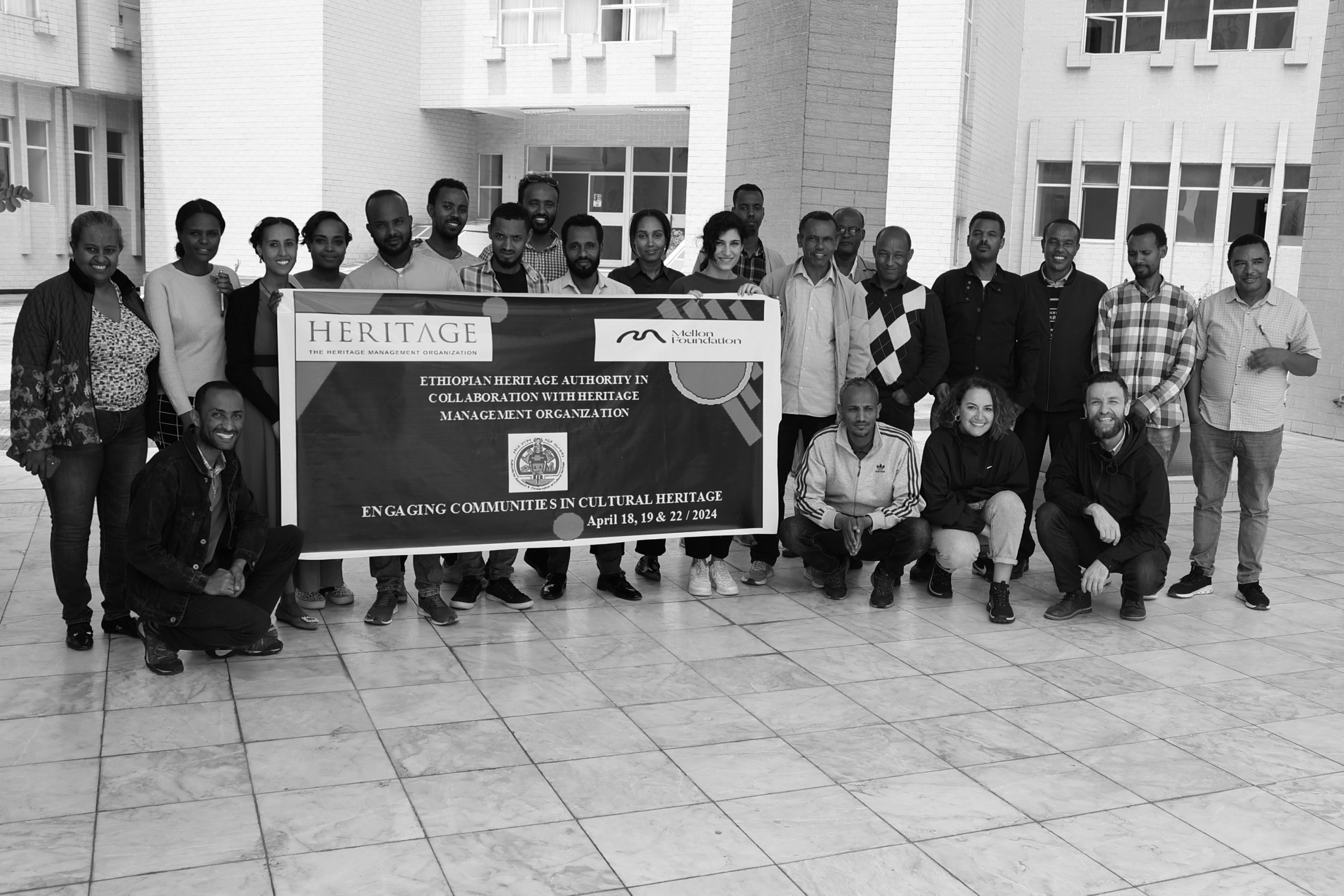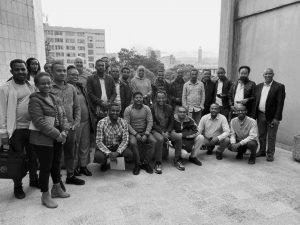Tag Archives: Ethiopia
Building Local Capacity for Heritage Conservation in Harar Jugal, Ethiopia
by Xanthippi Kontogianni, Ethiopian Program Manager, HERITΛGE
Harar Jugal, the fortified historic town recognized as a UNESCO World Heritage Site, stands as a living testament to Ethiopia’s rich cultural and architectural heritage. With its intricate alleyways, traditional Harari houses, centuries-old mosques, and lively open markets, Harar has long served as a cultural and commercial melting pot. The town holds immense historical value while simultaneously serving as a vibrant home for its local community. However, the preservation of this unique urban landscape is increasingly threatened by urbanization, inadequate maintenance, and the impacts of climate change.
To both leverage Harar Jugal’s potential for the benefit of its contemporary inhabitants and safeguard the historic center for future generations, there is a pressing need to develop specialized skills in heritage conservation, traditional building techniques, and sustainable urban management. Strengthening local capacity in these areas is essential to ensure that the cultural and historical integrity of Harar remains intact while responding to the evolving needs of its residents.
Walls of Harar Jugal.
In December 2024, the Culture and Tourism Bureau of Harar, one of the key institutions responsible for managing the Harar Jugal historic town, invited HERITΛGE to a virtual meeting. During the meeting, Mohammed Rabi, a representative of the Bureau, proposed organizing a heritage conservation workshop for Bureau staff and close collaborators. In alignment with its mission to train and empower heritage professionals to engage communities in stewarding their cultural assets for greater understanding, sustainability, and economic development, HERITΛGE welcomed the initiative and agreed to deliver the proposed training in Harar.
The workshop on Heritage Conservation was conducted in a blended format, combining online and in-person sessions held on 7-9 and 21-23 May 2025, respectively. This flexible format ensured accessibility while supporting dynamic, participatory learning. The training was led by Alexis Stefanis, Assistant Professor of Architectural Conservation at the Department of Conservation of Antiquities and Works of Art, University of West Attica. The curriculum was structured around three core content areas: General Principles of Cultural Heritage Conservation, First Aid for Finds, and Preventive Conservation. The online component delivered core theoretical content through lectures, readings, and discussions, while the in-person sessions emphasized hands-on exercises, group work, and live demonstrations. The workshop attracted 13 participants (8 men and 5 women) and was delivered under HERITΛGE’s HerMaP Ethiopia training program, which is funded by the Humanities in Place initiative of the Mellon Foundation.
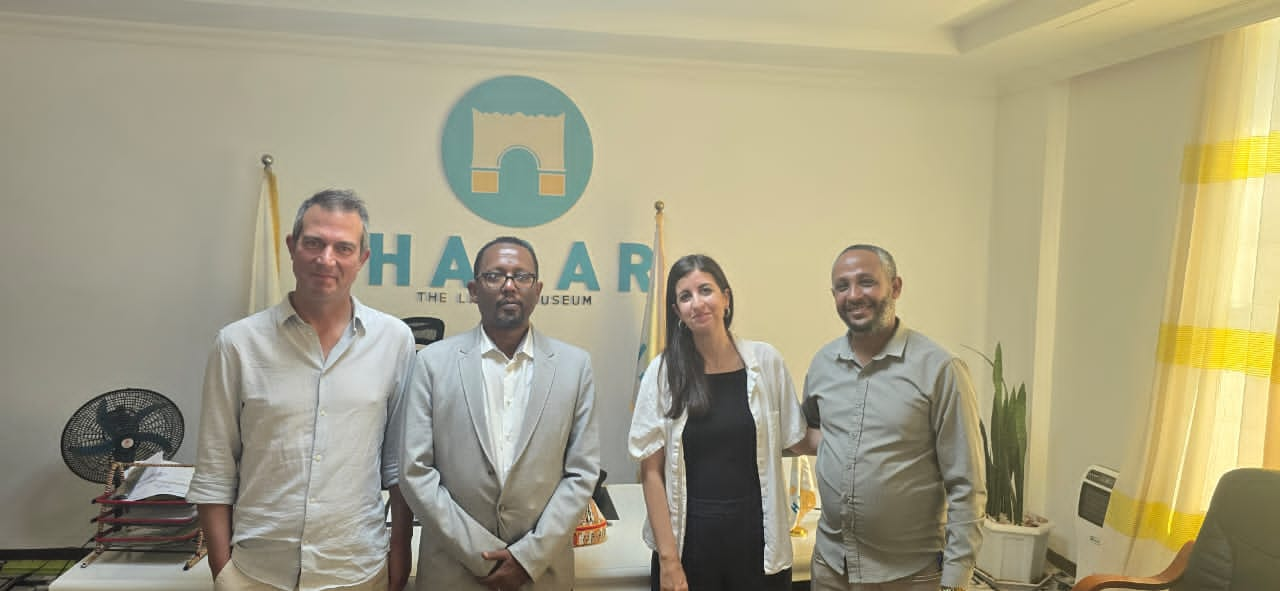 Networking meeting with Mr Teweleda Abdosh Ahmed – Head of Culture, Heritage & Tourism Bureau, Harari People Regional State.
Networking meeting with Mr Teweleda Abdosh Ahmed – Head of Culture, Heritage & Tourism Bureau, Harari People Regional State.
Participant engagement was enthusiastic and highly interactive. The hybrid structure facilitated broad participation, and both components were well-attended. One of the most impactful moments occurred during Dr. Stefanis’s live tool demonstration. After observing how the tools worked and understanding their applications, participants expressed a strong desire to use them directly. Encouraged by the facilitator, they took the tools outside and began applying them at actual heritage sites, collecting data and interpreting results on-site. Many cited this hands-on activity as the most transformative part of the training. Recognizing the value of practical learning, participants formally requested that the tools be made available for their ongoing conservation work.
Dr. Stefanis’s mission to Harar was supported by Natassa Nika, Africa Programs Coordinator at HERITΛGE, and Habtamu Gizawu Tola, HERITΛGE’s local representative in Ethiopia. Together, they met with key stakeholders, including the Culture and Tourism Bureau of the Harari People Regional State, the Construction Permit and Inspection Authority, and the Heritage Department of Haramaya University. These discussions highlighted the urgent need to preserve Harar’s distinctive heritage amid complex challenges. Participants identified priority areas such as capacity building in conservation and digital preservation, community engagement, and institutional strengthening.
These insights aligned with HERITΛGE’s ongoing mapping efforts in Ethiopia. Since launching its intervention program, HERITΛGE has conducted online surveys across the country to assess training needs and identify gaps in heritage management. Findings indicate that many professionals involved in conservation projects lack formal training, especially in areas such as architectural and artifact conservation.
Demonstration of tools.
The workshop and stakeholder meetings in Harar revealed not only the need for training and technical skills but also broader systemic challenges, particularly the lack of funding for project implementation and capacity development. Stakeholders emphasized the importance of collaboration, resource sharing, and establishing equitable partnerships. As a result, HERITΛGE and the Harar Culture and Tourism Bureau committed to ongoing collaboration and began developing a joint action plan.
Brainstorming sessions generated several promising ideas for future collaboration, including co-developing project proposals for funding calls, launching targeted capacity-building programs, and even establishing a university for conservation studies in Harar. As a first step, the partners agreed to draft a series of concept notes collaboratively, with the goal of developing a shared vision that would eventually lead to the signing of a Memorandum of Understanding (MoU) between HERITΛGE and the Bureau—formalizing the new partnership.
Overall, the experience in Harar marked a significant step forward in conservation capacity building and demonstrated the value of inclusive, hands-on training combined with strategic stakeholder engagement. It stands as a strong success story and a foundation for deeper collaboration in the preservation of Ethiopia’s unique cultural heritage.
Yahode Festival: Beacon for peace, reconciliation, and renewal in Ethiopia
Written by: Habtamu Gizawu Tola & Xanthippi Kontogianni
Ethiopia’s rich cultural landscape is a testament to its diverse heritage, and the Yahode festival stands as one of the most vibrant expressions of this legacy. Celebrated annually by the Hadiya people in the Central region, Yahode marks the New Year and is a significant Thanksgiving event, embodying the values of peace, reconciliation, and renewal. More than just a cultural celebration, Yahode offers organizations like the Heritage Management Organization a unique opportunity to forge connections with local stakeholders, assess the needs of Ethiopia’s heritage sector, and enhance heritage management capabilities in a meaningful way.
At the heart of Yahode is a powerful transition—from the darkness of the old year to the brightness of the new—imbued with forgiveness, gratitude, and the promise of fresh beginnings. This festival is a living symbol of unity and social cohesion, critical to the preservation of cultural heritage and the promotion of sustainable development. It showcases both the tangible and intangible aspects of Hadiya culture, from intricately decorated clothing and traditional cuisine to ritual prayers, conflict resolution systems, and dynamic performances of traditional songs. Yahode encapsulates the essence of living heritage, offering a snapshot of the values and practices that define the Hadiya community.
The festival begins with “Atakana Night,” a symbolic eve of transformation marked by cultural bazaars, panel discussions, community dialogues, and fashion shows. This gathering involves a broad spectrum of participants, from local community members and cultural organizations to government stakeholders, all contributing to the festival’s dynamic atmosphere. Following the eve, the main day of Yahode unfolds with a solemn blessing and prayer ceremony led by elders, giving thanks for the past year and seeking peace and unity for the year ahead. Traditional songs and dances performed by youth groups, alongside the Damara (Tomora) ceremony—where decorated firewood is blessed and burned to symbolize new beginnings—enrich the celebration. The day culminates in the ceremonial slaughtering of a specially selected ox, its meat shared among participants, reinforcing community unity and collective celebration.
The Yahode festival represents far more than a celebration of heritage; it is a microcosm of the social, economic, and spiritual fabric of the Hadiya people. The active participation of the Heritage Management Organization, represented by Habtamu Gizawu Tola (focal person of HERITΛGE in Ethiopia), at the Yahode festival on September 27-28, 2024, provided an invaluable platform for achieving two key objectives: building robust networks with stakeholders and gaining a deeper understanding of the local heritage sector’s strengths and needs. Engaging in such cultural events is crucial for organizations seeking to not only preserve heritage but also integrate it into broader developmental goals. By embedding itself in the cultural life of Ethiopia’s communities, the Heritage Management Organization can play a transformative role in ensuring that Ethiopia’s rich heritage continues to drive social and economic progress, fostering a future where cultural legacy and modern development walk hand in hand.
*Habtamu Gizawu Tola is HERITΛGE’s focal representative in Ethiopia and has also taken the photos featured here. Xanthippi Kontogianni is the organization’s Ethiopia Heritage Manager.
Community Engagement: second workshop in Ethiopia
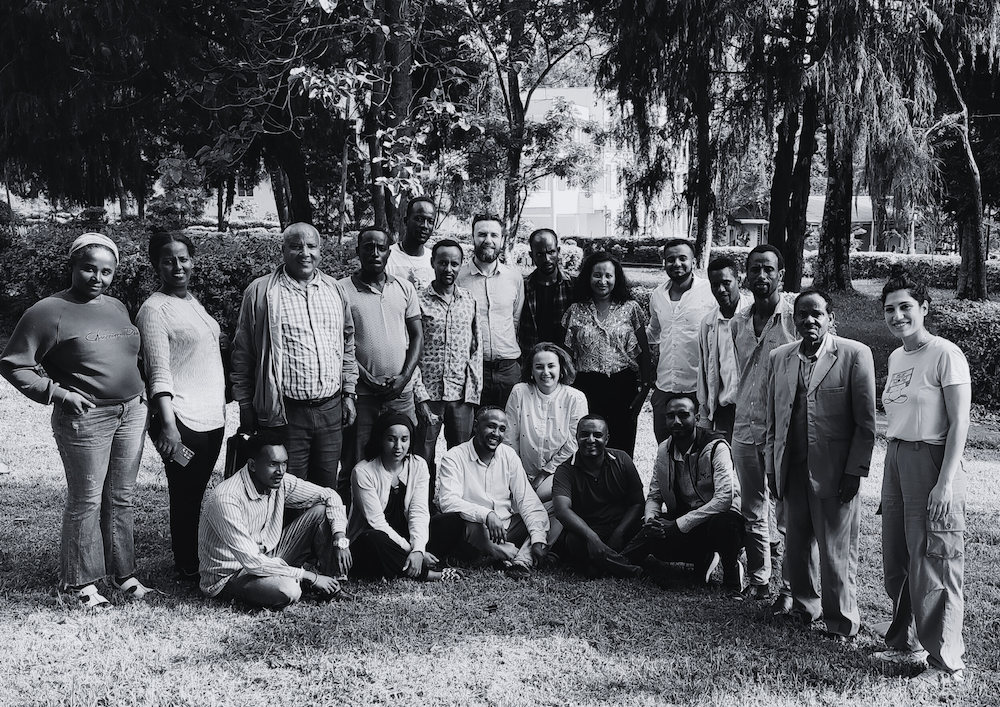 HERITΛGE traveled to Ethiopia for a series of training activities in April, including a 3-day workshop on Engaging Communities in Cultural Heritage, delivered in person to 22 heritage caretakers in Hawassa, a regional city in the Sidama Region. We held the workshop in Hawassa to improve accessibility and inclusion for people living outside the capital, Addis Ababa. The workshop was delivered in collaboration with Hawassa University which provided the premises of the Wondo Genet campus, 37 km from Hawassa’s town centre.
HERITΛGE traveled to Ethiopia for a series of training activities in April, including a 3-day workshop on Engaging Communities in Cultural Heritage, delivered in person to 22 heritage caretakers in Hawassa, a regional city in the Sidama Region. We held the workshop in Hawassa to improve accessibility and inclusion for people living outside the capital, Addis Ababa. The workshop was delivered in collaboration with Hawassa University which provided the premises of the Wondo Genet campus, 37 km from Hawassa’s town centre.
Led by Drs. Lena Stefanou and Aris Anagnostopoulos, the workshop focused on community engagement as one of the key strategies for preserving Ethiopia’s rich cultural heritage.
Participants included academics from Hawassa, officials from the Sidama and the Central Ethiopia Culture and Tourism Bureaux, and heritage managers from the Wako Gutu Foundation and a local private museum.
During the first day of the workshop, participants were introduced to the rationale for creating a community engagement plan. Participants were divided into working groups where they brought their real-life projects as examples for the exercises and the discussion, through our facilitation and guidance with specific questions and tasks.
On the second day of the workshop, we focused on the topic of audience development and audience segmentation. The last day of the workshop was dedicated to the oral history methods and techniques.
“The workshop provided invaluable insights and practical skills for enhancing my teaching, research, and professional practice,” said Abrham Fentaw Ketema, Head of the Ecotourism and Cultural Heritage Management Department, at Hawassa University. “Moving forward, I am eager to participate in similar training programs and collaborative projects from the HERITAGE organization. I believe that these opportunities not only enrich our skills but also contribute to the collective growth and sustainability of heritage preservation efforts.”
The training is part our HERITΛGE’s HerMaP Africa program that is generously supported by the Mellon Foundation’s Humanities in Place program.
Giving Ethiopian Heritage Managers the Tools to Engage Local Communities
In April, HERITAGE traveled to Ethiopia for a series of training activities, including a 3-day workshop in Engaging Communities in Cultural Heritage, delivered in person to 23 heritage managers in Addis Ababa; 22 officials from the Ethiopian Heritage Authority, and one from the Wako Gutu Foundation.
The workshop was led by Drs. Lena Stefanou and Aris Anagnostopoulos and focused on community engagement as one of the key strategies for preserving Ethiopia’s rich cultural heritage.
Through interactive sessions and real-world case studies, workshop participants explored how to identify communities, understand their needs and capacities, and develop effective engagement plans.
The workshop employed a participatory approach, blending theoretical frameworks with practical exercises. On day 1, participants focused on defining communities, collaboration strategies, and best practices. They identified real-life projects and engaged in group discussions to analyze community engagement strategies. The second day was devoted to audience development and segmentation. The group explored the concept of non-audience and strategies for engaging least engaged groups. Participants developed audience engagement plans and focused activities in team settings. The final day was focused on oral history methods and techniques, with participants learning more about interviews and archiving techniques and taking part in an immersive role-playing exercise that allowed them to practice interview skills and draft sample interview guides.
The training’s participatory approach and focus on real-life projects ensured its relevance and effectiveness, with participants saying they found the presentation insightful and adding that the workshop proved a collaborative effort that enriched their understanding of cultural heritage and community engagement.
This workshop was part of our HerMaP Africa program which is generously supported by the Mellon Foundation.
Strategic Planning for Ethiopian Heritage Managers
Ethiopian heritage managers completed a HERITΛGE Strategic Planning for Heritage Managers workshop online in late November. The trainees consisted of heads, directors, and experts representing the regional bureaus of Tigray, Somali, Oromia, and Amhara.
The workshop was led by Dr. Alexandros Papalexandris, Assistant Professor at the Athens University of Economics, and is part of the HerMaP Africa which is supported by the Andrew W. Mellon Foundation’s Humanities in Place Program. This was the second HerMaP Africa workshop to take place in Ethiopia and focused on these specific regions with the primary goal of increasing the capacity of the local Culture and Tourism Bureaus for strategic planning.
During this 3-day training, the participants got acquainted with the notion of strategy and understood why having a strategy is crucial. They had the chance to reflect on the mission and the vision of their bureau and set up strategic goals for the future. They identified different shareholders, and they analyzed the micro and macro environment of their region, using tools such as SWOT and Porter’s analysis. Finally, they learned how to recognize critical success factors in developing and implementing an effective strategy. As a result of the workshop, participants were encouraged to set up a business plan for the Culture and Tourism Bureau of their region, in collaboration with their teams and staff members.
“As Head of the Tigray’s Culture and Tourism Bureau, I found the workshop very helpful and at the same time challenging because it intensively encouraged me to be more critical of what I am trying to develop in my region, especially now, that we are in a post-war, post-crisis period and we are trying to re-operate our office,” said Dr. Atsbha Gebreegziabher, Head of the Tigray Culture and Tourism Bureau.
“The workshop was quite informative and very participatory,” added Selamawit Getachew from the Ethiopian Heritage Authority.
About Andrew W. Mellon Foundation
The Mellon Foundation is the nation’s largest supporter of the arts and humanities. Since 1969, the Foundation has been guided by its core belief that the humanities and arts are essential to human understanding. The Foundation believes that the arts and humanities are where we express our complex humanity and that everyone deserves the beauty, transcendence, and freedom that can be found there. Through our grants, we seek to build just communities enriched by meaning and empowered by critical thinking, where ideas and imagination can thrive.
Empowering Ethiopia’s Heritage Sector: HERITΛGE’s First In-Country Workshop
Preserving cultural heritage goes beyond the institutional practices of protecting ancient structures; it involves engaging communities, understanding shared heritage values , and building a future that respects local perceptions of the past. It is with this in mind that HERITΛGE held its inaugural workshop in Ethiopia in July, training 22 key heritage managers in Community Engagement in Heritage Management.
HERITΛGE Director, Dr. Evangelos Kyriakidis, and Xanthippi Kontogianni, Ethiopia Programs Manager, held the 3-day intensive workshop in Addis Ababa, welcoming heritage professionals representing a diverse range of stakeholders within Ethiopia’s cultural and creative industries. Among the participants were representatives from a diverse range of stakeholders including Jinka University, Madda Walabu University, the Ministry of Tourism, the Ethiopian Heritage Authority, the National Library, and various civil society organizations among them the Waku Gutu Foundation, Heritage Watch, and Save Heritage, History and Culture of Ethiopia.
The workshop is part of HERITΛGE’s program for Ethiopia, supported by the Mellon Foundation’s Humanities in Place program.
Nurturing Capacity for Community Engagement
At the heart of our Communities Engagement workshop lays a commitment to building capacity within heritage management. In an ever-evolving world, local communities are keepers of key information for the understanding of heritage while accountability for protecting their own history and values is indispensable and crucial for sustainable heritage preservation. HERITΛGE has structured the workshop to address these needs comprehensively.
Throughout the workshop discussion facilitated by Dr. Kyriakidis, participants shared examples and case studies from the Ethiopian context and explored the issues affecting the the management of cultural assets in the country, highlighting among others the challenges, needs and opportunities facing heritage managers.
Workshop Outcomes:
- A Network of Collaborators: The workshop serves as a nexus for like-minded professionals to network, share experiences, and collectively envision a future where heritage management is a catalyst for positive change.
- Diverse Perspectives: With participants from universities, government bodies, regional offices, and civil society organizations, the workshop brought together diverse viewpoints, sparking enriching discussions and cross-pollination of ideas.
- Community-Centric Approach: HERITΛGE’s emphasis on community engagement resonated strongly, setting the tone for a future where heritage sites become integral to community development.
- Concrete Strategies:Participants departed the workshop armed with practical strategies to enhance community involvement, integrate local narratives, and develop sustainable heritage management plans.

